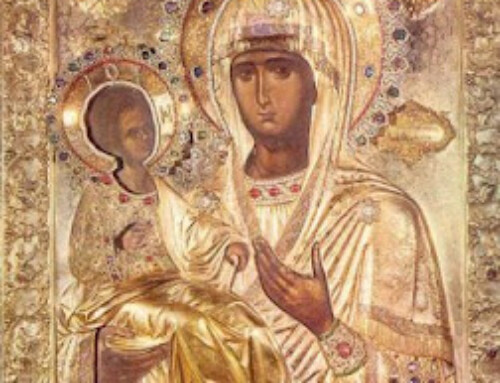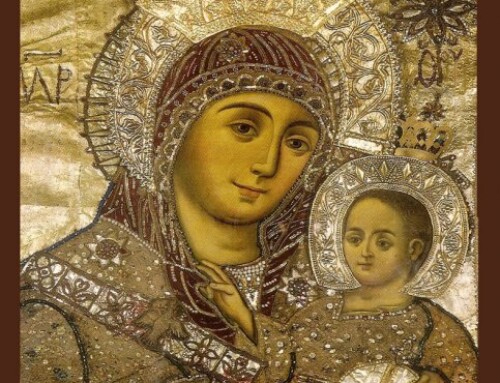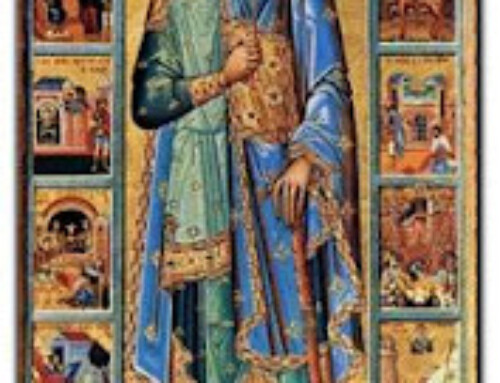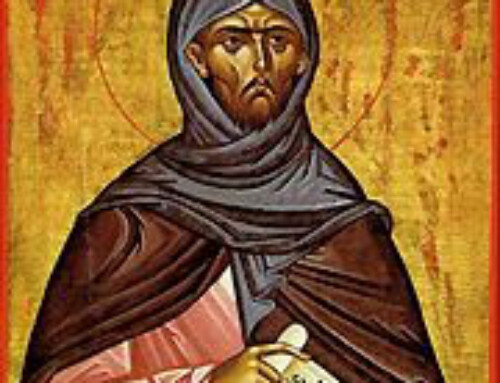Word Magazine June 1963 Page 3-4
SAINT JOHN CHRYSOSTOM
Author of Our Divine Liturgy
By Father Elias Dacy
John Chrysostom was a most devout and much persecuted Archbishop. Being a writer of extraordinary talents, he is mainly responsible for the shaping of the Divine Liturgy as it is used in our churches today.
Chrysostom, a great theologian and teacher, being in 403 A.D. the Archbishop of Constantinople, drew upon himself the hatred of the Empress Eudoxia and many bishops for his firm maintenance of the rules of discipline. His enemies were supported by Theophilus, Archbishop of Alexandria, who had condemned some poor monks as Origenists. They had come to Constantinople to seek for redress, and thus the famous question of Origenism was revived. Chrysostom did not think that it was profitable to reopen discussion on this question, but Eudoxia, who busied herself with theological questions more than a woman should, took the part of the monks against Theophilus, who was subsequently commanded to appear at Constantinople. However, before Theophilus had arrived, Chrysostom incurred the hatred of the Empress, who then decided to use Theophilus to achieve her revenge upon this great man, who had not learned how to yield to her caprices in servile submission.
It was not long before Theophilus, who had been summoned to the capital under the accusation of guilt; bore himself as the judge of Chrysostom, who had refused to judge him out of respect for the canons. Theophilus conspired with several bishops who were courtiers as well as corrupting some ecclesiastics with money and promise. Supported by the court, he assembled in the company of thirty-five other bishops at a place called The Oak, near Chalcedon. These
bishops acted as prosecutors, witnesses and judges, all at the same time. They dared not assemble in Constantinople where their actions would be open to the scrutiny of all the faithful people whom they feared because of their deep devotion to their pastor. Twenty-one of these bishops had come from Egypt.
While these bishops met at The Oak, Chrysostom was simultaneously meeting with forty bishops who remained loyal to him for the purpose of judging Theophilus according to the call of the Emperor. While he was conferring with these bishops, two messengers from the pseudo— council arrived to summon him to appear there. He refused to recognize his enemies as his judges. However, the pseudo-council proceeded to depose him and thereupon sent a message to Emperor Arcadius, saying that it was his duty to banish and even punish him for high treason, since he had insulted the Empress Eudoxia in one of his sermons. This amounted to a demand for his death. The entire populace rose against the council of The Oak, openly supporting their Archbishop, who would not leave the city unless forced to do so. The Emperor thereupon commanded one of his court officers to expel Chrysostom, using force if necessary. The saint took advantage of a moment when his faithful children had relaxed their vigil, left his house, and gave himself up to the soldiers coming to arrest him, and was conveyed by night to the port. However, the people discovered that their Archbishop had been taken from them and a great crowd followed after him, weeping. He was put on board a ship and was hurried off under the cover of dark, finally being landed on the coast of Bithynia.
Such a gross injustice caused a universal outcry. Several of the enemies of the saint repented of their calumnies; the people filled the churches and caused a continual clamor; a dreadful earthquake filled Eudoxia, the first cause of the crime, with terror. She attributed it to her injustice and hastened to recall Chrysostom. His people received him in triumph and his enemies either hid or fled from the city. Chrysostom asked that a council be called before which he could justify himself, while Theophilus, fearing to face honest judges, fled to Egypt. However, Eudoxia, having regained her composure and determination, renewed her persecution against Chrysostom who once more began to preach against her acts of injustice.
Theophilus was asked to return to Constantinople so that the intrigue of the council of The Oak might be carried out, but he contented himself this time by sending perfidious counselors. A new council was assembled and forty-two bishops voted in favor of the saint. However, the orders of the council, influenced by the court, accepted as legitimate his deposition by the pseudo-council of The Oak, and decided that Chrysostom, having been deposed by a council, and having reassumed his see without having been reinstated by another council, was guilty and deserved to be deposed. Chrysostom, indeed, had asked for a council immediately upon his return to Constantinople; the Emperor had granted his request, but Eudoxia had given contrary orders, since she did not wish a regular council but one composed of the enemies of the Archbishop. She carried her point and caused Chrysostom to be condemned for not having been reinstated by a council which she herself had prevented from being convened.
Persecution of the Archbishop was renewed following this unjust sentence. It was then that Chrysostom addressed himself to the West, writing to the bishops of the most important sees to set before them the violence and injustices of which he had been the victim. The object of these letters was to warn the Western bishops against the calumnies that his enemies might perhaps already have published against him and to beg of them not to take from him their charity and their communion. He was at that time (404 AD.) innocent in the eyes of Venerius of Milan and Chromatius of Aquileia. This, in addition to the fact that he stated that he was ready to defend himself before a tribunal if his adversaries would give him a fair trial, is sufficient proof that he did not carry his case to Rome, as a superior tribunal having authority over all of the Churches. It was quite natural that the Archbishop of Constantinople, persecuted by the bishops and imperial authorities, should 1ook to the West for assistance. The bishops who had declared for Chrysostom, as well as the people of Constantinople, also wrote to the bishops of the West, their letters being carried to Rome by four bishops and two deacons. They rightly believed that Theophilus would try to seduce the bishops of the West also. In fact, a messenger from Theophilus had arrived in Rome some days before the deputies from Constantinople and had handed to Pope Innocent a letter in which, without entering into any details, the bishop of Alexandria said that he had deposed Chrysostom. Some time later, he also sent the acts of the pseudo-council of The Oak to Rome. Innocent declared that he would remain in communion with both Chrysostom and Theophilus until such time as a council composed of Eastern and Western bishops could pronounce canonically upon the case. Accordingly, he asked that the Emperor of the West come to an understanding with his brother Arcadius, Emperor of the East, so that this council might be assembled. Honroius did, in tact, write to this effect, but the court at Constantinople wished to be revenged upon Chrysostom, and were determined that he should not he regularly tried. The holy Archbishop was again exiled. Arcadius was placed in his see without any observance of the canonical forms. When he died the following year, Atticus, quite as uncanonically, succeeded him.
From his remote place of exile, this righteous and unjustly persecuted Archbishop, having been betrayed by treacherous brother bishops of the same faith to satisfy selfishness and jealousy unbecoming of Christian hierarchs, wrote to Innocent, thanking him for his enthusiastic support in his cause. He also wrote similar letters to the bishops of Milan and others who had openly declared for him.
The entire East rendered justice to the great Archbishop after his death, recognizing him as a saint, restoring communion between the Churches of the West and East.
We do not here criticize the Empress since she was entirely outside of the Church and whose behavior was most brazen and undignified, but we do emphatically question the corruption and perfidy of his fellow bishops, who shamefully accepted the bidding of a selfish and sinful woman and who humiliated a bishop who did nothing but uphold the honour and dignity of the Christian
Church. He they should have defended at all costs, even unto the death! This is Christianity? This is honor?
Chrysostom in his exegesis was a pure Antiochene, basing his expositions upon thorough grammatical study and proceeding from a knowledge of the original circumstances of composition to a forceful and practical application to the needs of his day and all time. With his exegetical skill he united a wide sympathy and marvelous power of oratory. To the years of his presbyterate and episcopacy belong the great mass of homilies and commentaries, among which those on the statutes, Matthew, Romans and Corinthians are pre-eminent. His letters belong to the last years, the time of exile, and with his other works are valuable sources for the historical events of his time. He was a man of integrity, a brilliant student with an extraordinary knowledge of Christianity, willing to submit to the most extreme punishments and humiliations in defense of his ardent Christian ethics.





